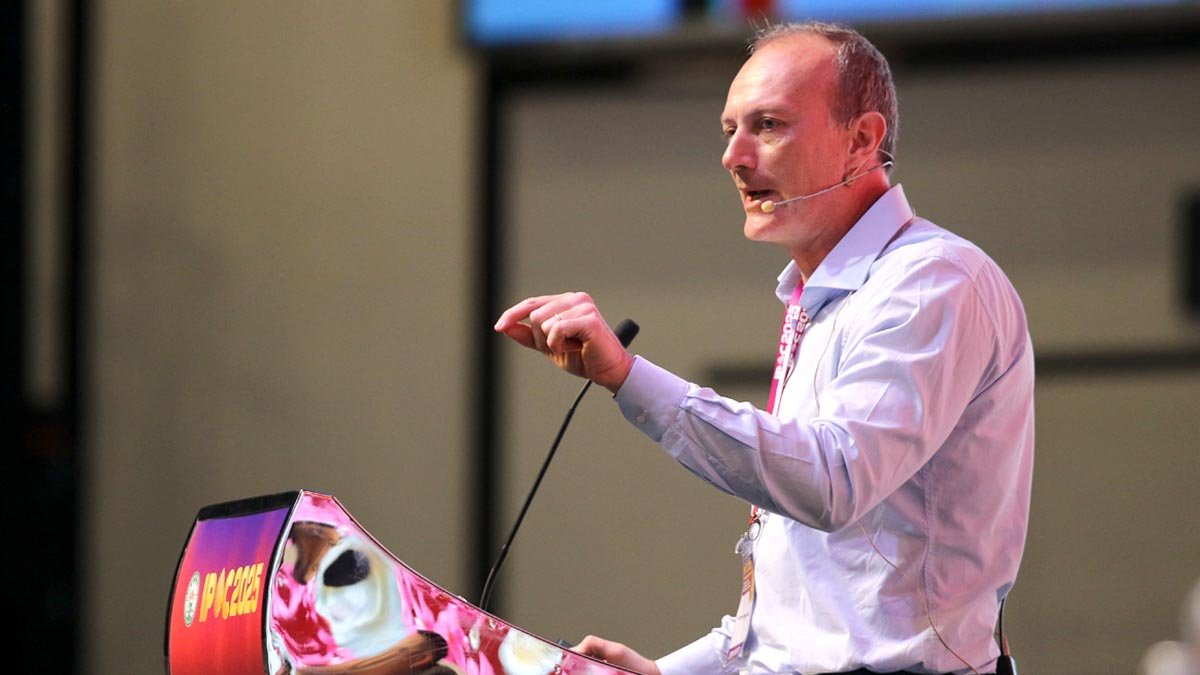PALMOILMAGAZINE, NUSA DUA, BALI— The global palm oil industry is at a critical crossroads as it faces tightening regulations and persistent negative public perception. This was highlighted by Adjunct Professor at John Cabot University Rome, Pietro Paganini, during day two of IPOC 2025. In his presentation, “EUDR and Beyond: Navigating New Frontiers for Palm Oil,” Paganini emphasized that the biggest challenge for palm oil today is not productivity, but perception and trust.
“Palm oil is the most productive and inclusive commodity, yet it suffers from the worst reputation,” Paganini said at the IPOC 2025 conference held at BICC The Westin Nusa Dua, Bali, on Friday (14/11/2025). He stressed that the gap between facts and perception has turned palm oil into an easy scapegoat, even though the commodity plays a crucial role in poverty alleviation, global nutrition, and efficient land use.
Speaking on the implementation of the EU Deforestation Regulation (EUDR), Paganini described the regulation as the beginning of a new wave of global market standards. Instead of viewing the EUDR as a barrier, he urged the industry to see it as a new competitive arena for building credibility and added value.
Also Read:
“Zero deforestation and full traceability will become the new global market norm. The EUDR is sparking a global race to build trust and innovation,” he told to Palmoilmagazine.com.
He welcomed the 24-month trial period, the one-year transition for SMEs and smallholders, and the establishment of a community of practice and steering committee, calling them pragmatic compromises that promote inclusive implementation.
Paganini also highlighted that technology should be considered a strategic investment rather than a financial burden.
“Technology is the new frontier for competitiveness and trust,” he said.
He pointed to the role of drones and satellites for monitoring and compliance, blockchain for transparency and traceability, and artificial intelligence (AI) for efficiency improvements. Increasing productivity through replanting, agronomic innovation, and land digitalization, he added, is a core pillar of sustainability.
“The higher the yield, the lower the pressure on land. That is real sustainability,” he said, adding that the industry must shift its focus from land expansion to smart, innovation-driven growth.
Also Read: Izzana Salleh: Indonesia and Malaysia to Reinforce Dialogue with EU on EUDR Implementation
Countering Negative Narratives Through Education
Paganini also addressed the rising anti-SAFA (saturated fat) policies and the growing use of “palm oil-free” labels, which he believes mislead consumers and fail to address the root issues of nutrition.
“The ‘palm oil-free’ label is nothing more than a marketing shortcut. It attacks an ingredient, not the actual nutritional problem,” he stated.
He called for data-driven communication, improved nutrition literacy, and systematic efforts to correct public misunderstanding.
In closing, Paganini urged producer countries and the palm oil industry to move beyond a reactive stance and assume a leadership role in global sustainability diplomacy. He underscored the need to build a new narrative that palm oil is not merely a commodity, but a force for development, prosperity, and innovation.
India’s Production and Market Outlook
Meanwhile, Atul Chaturvedi, Chairman of the Asian Palm Oil Alliance (APOA), said that India is at a pivotal point in meeting its national vegetable oil needs. With rising consumption and high import dependence, India must take strategic steps to boost domestic production while strengthening partnerships with producing countries.
“India is the world’s largest vegetable oil market, but also the most vulnerable, with 60% of its supply coming from imports. This challenge cannot be addressed through tariffs alone; it requires increased domestic production and stronger regional cooperation,” Chaturvedi said.
He noted that India’s demand for vegetable oils is projected to rise significantly alongside economic and demographic growth. Now the world’s fifth-largest economy, India is expected to climb to third place by 2030.
India currently accounts for 11% of global vegetable oil demand. National consumption stands at around 26.5 million tons, with palm oil making up 37%. The country imports 8.25 million tons of palm oil, representing half of its total vegetable oil imports.
By 2047, India’s vegetable oil consumption is expected to reach 50 million tons, with palm oil demand potentially rising to 19 million tons.
“The question is simple but critical: where will all that oil come from?” Chaturvedi stressed.
India has repeatedly adjusted import tariffs to manage consumer prices and protect farmer margins. However, Chaturvedi argued that tariffs are not a long-term solution.
“High tariffs are like a snake eating its own tail. Instead of hurting foreign exporters, they burden domestic consumers. Prices rise, purchasing power falls, and the industry suffers.”
Stay up to date with the latest IPOC 2025 news at Palmoilmagazine.com. (P3)
